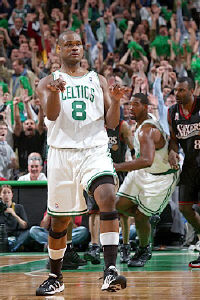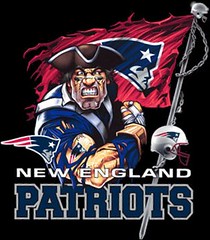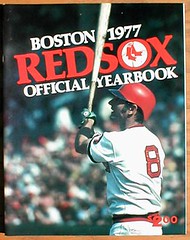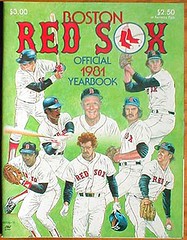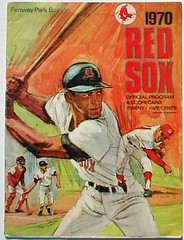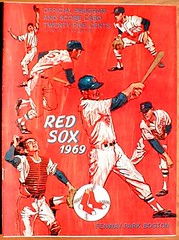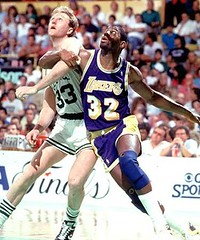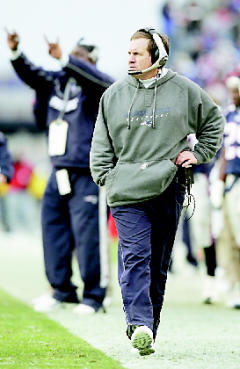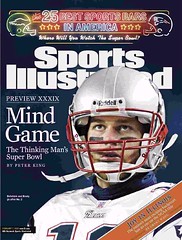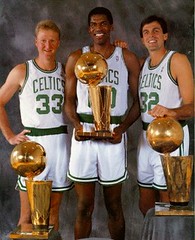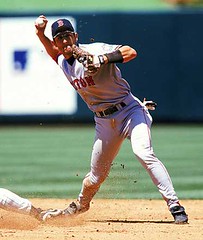Thursday, December 16, 2004
RED SOX STAT GEEK SAYS PEDRO WILL BE MISSED
VORP (http://www.baseballprospectus.com/statistics/vorp_player2004.html) is Value over Replacement Player, which basically means that it's the number of runs (Player X) contributes over a 'replacement', which is usually defined as the worst major leaguer at a given position.
All Ahead VORP 101
Ground RulesThe way to evaluate any trade is whether it makes the team better. The trouble is, defining "better".
The offensive metric of choice is VORP, Value Over Replacement Player. If you don't know what it means or how it works, you could look it up. Short version: VORP is denominated in runs, telling you how much better one player is than a hypothetical, freely available replacement. (The actual availability of such players has yet to be shown by VORP's proponents in my mind, but take it for what it's worth.)
We won't use the better metric, Win Shares, and hence, Win Shares Above Average, for now because of the expense of calculating it historically. Win Shares represents an improvement over VORP because VORP really only measures the player's offensive value (except for pitchers), but Win Shares also accounts for defensive value. Historical Win Shares are not readily available online before 2003.
One advantage VORP does have over Win Shares is that Baseball Prospectus has a system -- PECOTA -- that projects a players' value over the course of a 162-game season. This system does so over a range of probabilities, from 10th percentile (horrible, worst case, most unlikely) to 90th percentile (Best case-also unlikely). We'll be using the difference between projected VORP and actual VORP as a simple yardstick to measure a player's worth.
By VORP, Arroyo was the 29th best starting pitcher in the American League (24.7). Better than Wakefield (9.4), but not as good as Wells was in the NL (40.3).
VORP for AL starters
Johan Santana 88.8
Curt Schilling 72.9
Brad Radke 60.1
Jake Westbrook 54.4
Kelvim Escobar 53.2
Pedro Martinez 51.2
Mark Buehrle 50.8
Tim Hudson 48.6
Rodrigo Lopez 47.3
Ted Lilly 44.6
Rich Harden 41.3
Carlos Silva 40.5
C.C. Sabathia 40.2
Ryan Drese 39.8
Mike Maroth 39.2
Mark Mulder 37.2
Zack Greinke 36.4
Freddy Garcia 35.1
Barry Zito 31.5
Kenny Rogers 29.5
John Lackey 29.3
Robert Madritsch 28.0
Orlando Hernandez 27.6
Jon Lieber 27.3
Jeremy Bonderman 26.4
Kevin Brown 26.4
Roy Halladay 26.1
Jon Garland 25.2
Bronson Arroyo 24.7
All Ahead VORP 101
Ground RulesThe way to evaluate any trade is whether it makes the team better. The trouble is, defining "better".
The offensive metric of choice is VORP, Value Over Replacement Player. If you don't know what it means or how it works, you could look it up. Short version: VORP is denominated in runs, telling you how much better one player is than a hypothetical, freely available replacement. (The actual availability of such players has yet to be shown by VORP's proponents in my mind, but take it for what it's worth.)
We won't use the better metric, Win Shares, and hence, Win Shares Above Average, for now because of the expense of calculating it historically. Win Shares represents an improvement over VORP because VORP really only measures the player's offensive value (except for pitchers), but Win Shares also accounts for defensive value. Historical Win Shares are not readily available online before 2003.
One advantage VORP does have over Win Shares is that Baseball Prospectus has a system -- PECOTA -- that projects a players' value over the course of a 162-game season. This system does so over a range of probabilities, from 10th percentile (horrible, worst case, most unlikely) to 90th percentile (Best case-also unlikely). We'll be using the difference between projected VORP and actual VORP as a simple yardstick to measure a player's worth.
By VORP, Arroyo was the 29th best starting pitcher in the American League (24.7). Better than Wakefield (9.4), but not as good as Wells was in the NL (40.3).
VORP for AL starters
Johan Santana 88.8
Curt Schilling 72.9
Brad Radke 60.1
Jake Westbrook 54.4
Kelvim Escobar 53.2
Pedro Martinez 51.2
Mark Buehrle 50.8
Tim Hudson 48.6
Rodrigo Lopez 47.3
Ted Lilly 44.6
Rich Harden 41.3
Carlos Silva 40.5
C.C. Sabathia 40.2
Ryan Drese 39.8
Mike Maroth 39.2
Mark Mulder 37.2
Zack Greinke 36.4
Freddy Garcia 35.1
Barry Zito 31.5
Kenny Rogers 29.5
John Lackey 29.3
Robert Madritsch 28.0
Orlando Hernandez 27.6
Jon Lieber 27.3
Jeremy Bonderman 26.4
Kevin Brown 26.4
Roy Halladay 26.1
Jon Garland 25.2
Bronson Arroyo 24.7





















